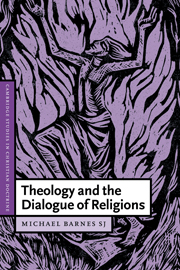9 - Negotiating the middle
Published online by Cambridge University Press: 04 December 2009
Summary
This book has been addressed primarily to the Christian community. What I have argued, however, is that Christian identity cannot be understood in isolation from other communities of faith. If the lengthy route which I have traced from the ‘context of otherness’ to the perichoresis of the triune God is anything like an adequate account of the philosophical and theological issues surrounding alterity and subjectivity, then to be Christian is to exist in relationship. That may be considered a fairly meagre outcome for so much effort; in some sense all communities, all societies, all persons, need to be considered in relational terms. But, to repeat a point made in the chapter on the experience of the Indian Church, the question is not whether identity can be understood relationally, but how within or between particular societies or communities relationships are to be developed and how they are to change. Any relationship with the other is particular. What my use of descriptive heterologies has shown is that, as long as persons continue to exist in time, the other always returns to disturb the self-sufficient world which they create. For Levinas, it is this ethical primacy of the other which challenges any totalising account of relationality. Being in relationship means seeing oneself ‘in the accusative’, attending not to strategies which maintain mastery of the other across time, but to the more awkward and demanding experience of waiting before what he would call the ‘face of the Other’.
- Type
- Chapter
- Information
- Theology and the Dialogue of Religions , pp. 230 - 254Publisher: Cambridge University PressPrint publication year: 2002



